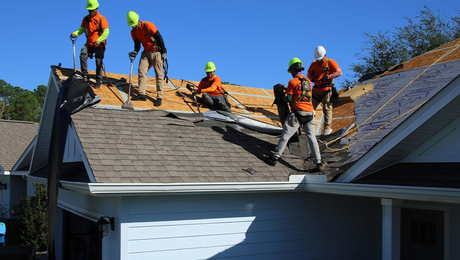Now that I’ve lived in my house almost a year I understand my moisture problem better.
The house is built into a hill. THe deepest corner is a bathroom (totally windowless) and a bedroom in front of it. I think that the bathroom is completely below grade at the back wall. There’s enough moisture (RH) that I run a dehumidifier that gets about 1 gallon of water out of the air a day. But it’s not just the bathroom. I ran the dehumidifier in there with the door closed.. still got moisture in the bedroom.
Is there a better way? There is drainage from the back of the house away from the house – I can see the pipe For esthetic reasons I’m considering taking out the bathtub and putting in tiled shower which means that some of the walls will be stripped down – what can I do from the inside to block the moisture from coming in? Can I do that?
Thanks for help. BTW I flipped out when I first discovered the moisture.. There’s a discussion about it last September.















Replies
I don't remember the thread and wasn't inclined to search for it. You should fill in your profile (location at least) so we'd know your climate.
Underground concrete houses are all I'll build. Obviously rh is something I deal with. Not a problem, but you need to understand where the moisture's coming from. Through the buried wall, or from your air? If you have a leaky wall, think excavation.
Summers here, central Virginia, we know humidity. My walls don't leak but I deal with excess indoor humidity by dehumidification. Primarily with a heat pump water heater. I'm doing a total air change every 2 hrs (.5ACH) but that air needs to be dried before bringing it into the house or we'd have a larger indoor problem.
Occupants can make a large rh difference, particularly in a small space, making air changes even more important. 2 of us in 20k cu ft, no issue.
My head building inspector did a 180º attitude turnaround after I built. Before, he strongly advised everybody against concrete underground. Problem? Excess moisture. When I asked where the water was coming from he admitted he didn't know. Now, he occasionally suggests someone call me to ask how I went about preventing a problem that he used to believe was insurmountable.
PAHS Designer/Builder- Bury it!
Thanks for your response. What I get out of the two responses is that the way to deal with interior moisture is not with building materials but rather with machines that deal with the moisture - either heat pump air exchanger, dehumidifier, venting fan with automatic controls based on humidity in the air. So to push this a little further if you are willing... what are the pros and cons of each? Or send me to a good source?Thanks.
If you've got excess moisture you've got 2 possibilities. Reduce the moisture (stop breathing/bathing?) or deal with it.
In Vermont I'd guess that all you need is air changes, but I'm only guessing at your inside/outside rh. Which you need to measure if you want to get the best solution. Most would simply run an exhaust fan, letting leaks provide make-up air. Works, if the incoming air is dry enough.
I prefer better control. Our air system has nothing to do with a heat pump, it's simply a heat exchanger with 2 tiny fans, one bringing in outside (filtered, dehumidified if needed) air with the other fan pushing interior air outside. I vary the size of the fans to slightly pressurize the house, ensuring that all leaks go out. Attached is the DIY plan from Pop Science that I started with. Changed a couple of features.
Guests not infrequently mention the quality of our indoor air. It's excellent. I ran duct everywhere, including closets, to ensure fresh air supply.
The heat pump water heater simply provides us with hot water, roughly 3x the efficiency of a standard resistance tank heater. The most interesting part is the free byproduct, cool dry air. You can read about them: http://www.energy.wsu.edu/ftp-ep/pubs/building/res/ht_pmp_water_htrs.pdf Ours (from ebay) paid for itself in just over one seasons' dehumidification use, but we were already serious about active dehumidification (we normally figure $1/day seasonal dehumidification cost for our 20k cu ft). This year we've gotten a large majority of our dehumidification free, from the heat pump.
We have no winter indoor excess humidity here, though we use more hot water then and spend more time indoors. That's normal, as most houses are leaky enough. Extremely tight non-ventilated houses will have a problem. Ours is extremely tight- we ventilate. PAHS Designer/Builder- Bury it!
>>>what can I do from the inside to block the moisture from coming in? Can I do that?
This approach will be of very little benefit as most of the moisture in the house does not migrate from the backfilled earth; it comes from the shower, people's exhaled breath, cooking, plants, and a million other sources of moisture in interior air. The most obvious, and cheapest, solution is to put a good sized exhaust fan (>100 CFM) in the bathroom and vent it to daylight. Put it on a timer or humidistat, or run it continuously.
Scott.
Always remember those first immortal words that Adam said to Eve, “You’d better stand back, I don’t know how big this thing’s going to get.”
It's likely that it's coming from the two bathrooms - the venting is poorly done - but why only in the summer? My part of the world is not particularily humid (Vermont). I suppose that you'll say that the winter heat evaporates the moisture? If this is true, and it's people then I'll be doubly justified in tearing out bathtub - taking down the bathroom to the studs and adding a much better fan and venting system as part of the renovation. ? Hmmmm.